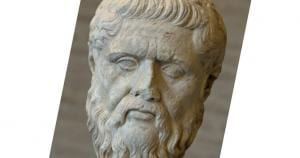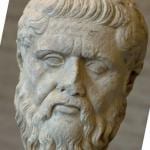 What is going on?
What is going on?
If we wish to follow the Logos where He leads, we need to listen to critics, especially those with interesting things to say. Jeff Williams is a critic of metaphysics. A University of Chicago grad, he agreed to present his argument and I have posted it here unedited (except for some formatting and the title). As result of his rejection of metaphysics, he rejects objective moral law as an illusion.
Mr. Williams previously argued that Athens has no need of Jerusalem, which contributes nothing good to Western civilization. I responded and enjoyed the interaction immensely. Mr. Williams has taken the time to discuss Martin Heidegger, a philosopher not much in favor when I was in graduate school. I have enjoyed reading more Heidegger (alas in translation). As usual, I allowed his post to stand without comment for a time and now here is a response.
Thank you for this careful work Mr. Williams!
Some Illusions about Metaphysics and an Objective Moral Law
Jeff Williams claims an objective moral law is based on a metaphysical mistake. Talk to Williams enough and he will state that metaphysics in general is a mistake. I think Mr. Williams is the victim of a several illusions about philosophy, the history of ideas, and metaphysics. These were once fairly common in a certain sort of “great texts” program and are worth a good airing.
Before taking on what I think are mistakes, a note of appreciation is in order. There is much to enjoy in Mr. Williams attack on objective moral law and metaphysics. He reads German, I do not, and he knows his Heidegger, a philosopher that like many (most?) analytic philosophy departments in the late twentieth century was not a focus of study. I will assume everything he says about Heidegger is accurate to Heidegger, though I know just enough to know that his reading and respect for the philosopher is not universal in the profession. My argument will not then be with Heidegger (a philosopher I do not know as well as Williams), or his take on Aquinas, but Williams.
Williams was kind enough to summarize his case in his opening paragraph:
Most Christian Apologists claim an objective God-given moral law. Its ontology, however, is confused in that this objective law would necessarily lie outside any individual subjectivity as an external, immutable, and verifiable object. At the same time, it is somehow accessible to all even though nobody has ever actually seen it. The explanation for that is usually a muddle claiming it is “written in our soul” which now turns it into subjective knowledge from internal sensibility, with no corresponding objective cause, of something that is supposed to be purely objective. This muddle is inherent in the Medieval Scholastic metaphysics from which it springs.
Whatever the merits of his reading of Heidegger, and I am assuming it is perfect, this paragraph, not Christian claims, is a confused muddle.
First, one need not accept that God’s “moral law” is an object separate from God’s own will. On this view, God, a person, has a will that God can share with other persons (humans, angels, and any other sentient life forms). There need not be a Platonic form of “moral law” out there apart from God. Persons learn from other persons all the time and if how this works is mysterious, and often contains misunderstandings, that this happens is a given. Mr. Williams and I are communicating now. God as a person could also communicate with me!
God, being God, is by definition good. If so, then God’s “will” or “opinions” on morality would be co-extensive with moral goodness. To be simple: God has a moral experience that God can share with other persons, especially those of us created in God’s image. The moral law would be the way God “experiences” the world, the moral choices, and so could be communicated to us.
Second, if we assume that God is co-eternal with some Form of the Good (an object that exists apart from God’s mind), then Mr. Williams is still confused. He claims nobody has ever “seen” this form, so it cannot exist. Surely though Williams is begging a metaphysical question. If a moral law existed, it would not be the kind of being that could be “seen” with our eyes. Instead, it would be the kind of being that we discover with our minds like numbers or mathematical objects.
Of course, even our vision is interpreted in our minds and we can be wrong about what we see! Precisely no thought takes place outside of our minds, so the discovery of a mathematical object (such as “1”) might be more certain, indeed indubitable, as compared to “seeing” an elephant. We might be mistaken in our vision of an elephant, confusing a model for the real thing, but once we “grasp” an idea or a mathematical object, then we no longer doubt the idea. Mr. Williams rejects all sorts of objects (ideas, numbers) and not just moral objects. He does not argue for this, just assumes it is so.
Williams packs a good bit of philosophy without argument into the word “verifiable.” What does this mean? Evidently that it is accessible to all and we have seen it. Leave aside the puzzling notion of “seeing” that (for us) is not an internal mental experience, we still ask why Williams thinks a moral law is not “verified?”
Surely it cannot be because people do not all agree about this “law?” Physical laws exist, but people have not always known them or agreed to them. People make moral mistakes. They might be morally blind. That an object exists does not mean you or I (in particular) will be able to “see” it. That we do not get it, see it, experience it, does not mean an object does not exist.
An object can also exist (external to us), but we come to understand it more fully or even differently over time. Beasts exist, but over time we have seen that some species exist in particular ways in relation to an ecosystem. Our view of these beasts has changed over time, but the beasts did not!
Williams thinks that the “solution” proposed by those muddled Christian apologists as to how we know objective moral truth is inherently problematic: “The explanation for that is usually a muddle claiming it is “written in our soul” which now turns it into subjective knowledge from internal sensibility, with no corresponding objective cause, of something that is supposed to be purely objective.”
If we accept (as we need not), that this is what Christian apologists would say, Williams has fallen into incoherence in his response. Assume that a person (with full mental health) is “hardwired” by God to recognize a moral truth as moral truth. This does not turn our knowledge of this external truth into “mere” subjective knowledge. If an objective moral truth existed, then our living in the world would bring us into contact with that moral truth. We would then recognize that (not unlike our experience of mathematical truths) with an “AHA!” moment. The outer reality triggers the inner response.
It is not merely subjective. We do not find the “moral truth” merely by internal reflection, but by our “external” experiences of life: moral reality. Our decisions about what is “real” are never purely objective. Our internal mental states are always involved. However, Williams cannot simply assert that our ability to recognize an object when we encounter it means the object has no “corresponding objective cause.” In short, Williams has not understood (from the start) the argument he intends to refute.
We experience any external reality: a brick, a beast, a moral moment. We question what we are experiencing, often getting our own experience wrong. Over time, however, enough of us who see well begin to understand bricks, beasts, and morality. We are hardwired by God to divide the world up correctly enough to still “get it.” As a result, we can speak to each other, translate other languages, and understand the world. There is an external reality that enables us to understand all kinds of external experiences, including moral ones.
Williams goes on, I fear, to quote Heidegger on metaphysics like a Christian fundamentalist quoting the Bible. Evidently Heidegger asserts all sorts of things about the history of ideas, metaphysics, and philosophy. Perhaps he does, but most of these ideas are at best debatable. Heidegger may be right and Williams has (I assume) done us a favor by summarizing his views, but philosophy did not end with Heidegger.
For example, Williams (or Heidegger) can assert that “being exists only in this physical realm,” but this is an increasingly dubious idea and badly defined.
The key to understanding the difference between Being and actus essendi is to keep in mind Heidegger’s insistence on steadfastly not retreating to metaphysics, which is always ungrounded as a product of imagination rather an authentic thinking of Being in the world.
Williams can command us not to retreat into “metaphysics” (in his metaphysics), but he does not give us any reason other than more assertions drawn from Heidegger. There is a vast literature of Thomist responses to such assertions. Here is one. This much is certainly true: Heidegger did not finish off metaphysics, which remains a fecund discipline and Thomism (to give but one theistic philosophy) was about to experience a revival right about the time of his death.
We should feel to free to question Williams (or Heidegger)! The example of human consciousness defies the idea that being “exists” only in the physical realm. Perhaps when Heidegger was writing, a promissory note about the problem was adequate, but physical or material solutions to the “hard problem” of consciousness only look more dubious now.
In addition, the entire history of philosophy Williams (Heidegger?) produces is dubious. For example, we have (at best) fragments of pre-Socratic philosophy. To make broad claims about what they believed, as opposed to Aristotle (for example), and see all of Western philosophy making a wrong turn after them is to see in a fragmentary record what one wishes to see. For example, Parmenides may have written in poetic form, but his central argument hangs on a bit of metaphysical pre-logic. It also ignores more recent philosophy of science that shows the relationship between the development of science and theistic metaphysics.
This certainly is true: if Williams (or Heidegger) is right in all his claims, then theism is an error, metaphysics is an error. However, as we have seen, few of these claims are persuasive. Perhaps most importantly, without recourse to flights of fancy, the morally terrible may be as justified as the morally good on Williams’ view. If we must buy all his definitions, warnings, and ideas, then we must. Truth should be followed, but Williams has given us no reason to do so.
Finally, Williams ends with an odd series of claims that make me suspect the entire project is jargon ending where the (particular) Heideggerean always wished to go morally. Williams says:
Meanwhile, Being seems to be having its own way without our notice. Since historicity is an element of World, we can trace a direction in our understanding of morality over the millennia which appears to evolve toward more inclusion, empathy, respect for individuality and freedom. Ontically, we can describe this through scientific description of evolution, but the true ground of this occurrence goes deeper. There are setbacks and fitful advances, but over time the trajectory reveals itself.
This is less poetic language than artful smuggling of all sorts of comforting metaphysical ideas into Williams’ philosophy without paying the price of rigor of expression. Williams wants us to deny metaphysics, but then gives us metaphysics on the cheap.
Try asking some questions of this summary based on what Williams claims in the body of his article.
What does it mean for Being “to have a way?” If we can trace our understanding of morality, should we accept that understanding? Whose understanding? When? Williams appears to be citing moral developments that also are co-extensive with the spread of Christianity globally. Is he just selectively borrowing from another metaphysic’s success? Or is he entirely wrong about the arc of history?
Ultimately, on his view why should we follow what “Being” is doing? Is it that we must go “this” way as parts of Being? What if we dare to imagine an alternative? Should we do this? Human imagination is (according to Williams) unconstrained by “reality.” If so, then why mayn’t we prefer an alternative to the direction of Being? We might not even be able to effect that change, but our very defiance in preference might be more moral than what we see “history” doing?
The moment we even merely imagine an alternative, then metaphysics has returned with a vengeance! Merely telling us that we must prefer “authentic” reality to our “imagination” is just a power move. Why? Haven’t our moral imaginations of “should” as opposed to “always was” produced great moral advances? A worldview hostile to “imagination” that then smuggles meaning and moral “advance” back in by arguing for a poetic way of reading the world (as opposed to logic) has failed. If I can imagine a better world,* then why should I not prefer that world? What is wrong with a moral imagination?
Is it “inauthentic?” What does this mean? Why should I prefer “authenticity” to “beauty?” Who decides how to read the “meaning” of history on an evolutionary account?
If evolution is true, should I view nature as “red in tooth and fang?” Why shouldn’t a Heidegger look at a “will to power” movement or militarism favorably? What would stop him? Is it this “true ground” of occurrence? If not, how do we find the true ground if “survival of the fittest” is not it? If I do find it, why should I wish to be “authentic” if being “authentic” turns out to be horrible?
Williams (not so shockingly) as a decent man raised in an overwhelmingly Judeo-Christian nation, the recipient of a fine Western education, sees history in terms of Whiggish progress. German thinkers of Heidegger’s era, or Victorians of colonial Britain, had darker visions. Ask the nineteenth century resident of the Congo. Visit a Gulag. Go to the labor camps of China today.
Thank God there is a God and moral truth.
———————————-
*See Puddleglum with the Witch in The Silver Chair by CS Lewis.












